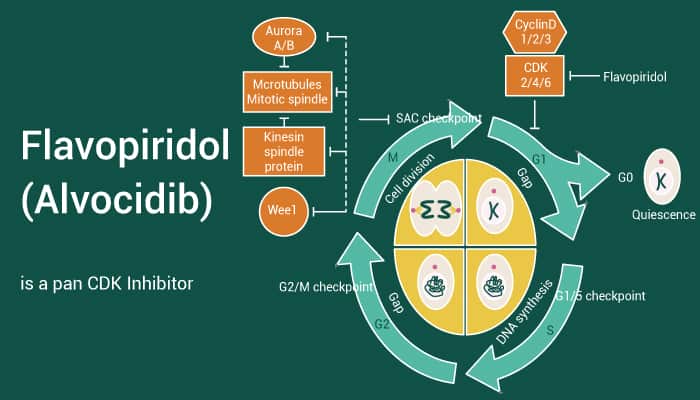The cyclin-dependent kinases (CDKs) are serine/threonine protein kinases. And it exhibits drives force behind the cell cycle and cell proliferation. CDKs contain at least a catalytic subunit (CDK) and a regulatory subunit (cyclin). To date, at least 10 CDKs and 15 cyclins have been identified. Once activation, CDKs phosphorylate and modulate the activity of a variety of cellular proteins after activation.
Flavopiridol robustly induces a distinct pattern of ER stress in CLL cells that contributes to cell death through IRE1-mediated activation of ASK1 and possibly downstream caspases.
Chronic lymphocytic leukemia (CLL) is a progressive B-cell malignancy. Besides, Flavopiridol is the first broad inhibitor of CDK enzymes. And it has entered clinical development for CLL. Preclinical studies by several groups show that Flavopiridol mediates potent apoptosis in CLL cells that occur independently of del(17p13.1) or loss of p53 function.

Autophagy is an intracellular process. Additionally, it plays a role in normal cell homeostasis. In this process, misfolded proteins, damaged/aged organelles, or other intracellular components are sequestered inside a double-membrane vesicle called an “autophagosome”. And then it fuses with lysosomes to allow degradation of its contents. Flavopiridol promotes the appearance of double-membrane structures suggestive of autophagy.
Flavopiridol is a broad spectrum and competitive inhibitor of CDKs.
It inhibits CDK1, CDK2, CDK4 with IC50s of 30, 170, 100 nM, respectively. What’s more, Flavopiridol robustly induces a distinct pattern of ER stress in CLL cells that contributes to cell death through IRE1-mediated activation of ASK1 and possibly downstream caspases.
Flavopiridol results in potent upregulation of a number of PRGs in treatments lasting 4-24 h. Additionally, Flavopiridol has immediate and long-term effects on the expression of several PRGs. In serum-starved cells re-stimulated with serum, Flavopiridol also inhibits the expression of these genes, but subsequently, JUNB, GADD45B, and EGR1 are upregulated in the presence of Flavopiridol.
In conclusion, Flavopiridol is a potent CDKs inhibitor with anti-cancer activities.
Reference:
[1]. Mahoney E, et al. 2012 Aug 9;120(6):1262-1273.
[2]. Keskin H, et al. Cell Div. 2012 Mar 29;7:11.